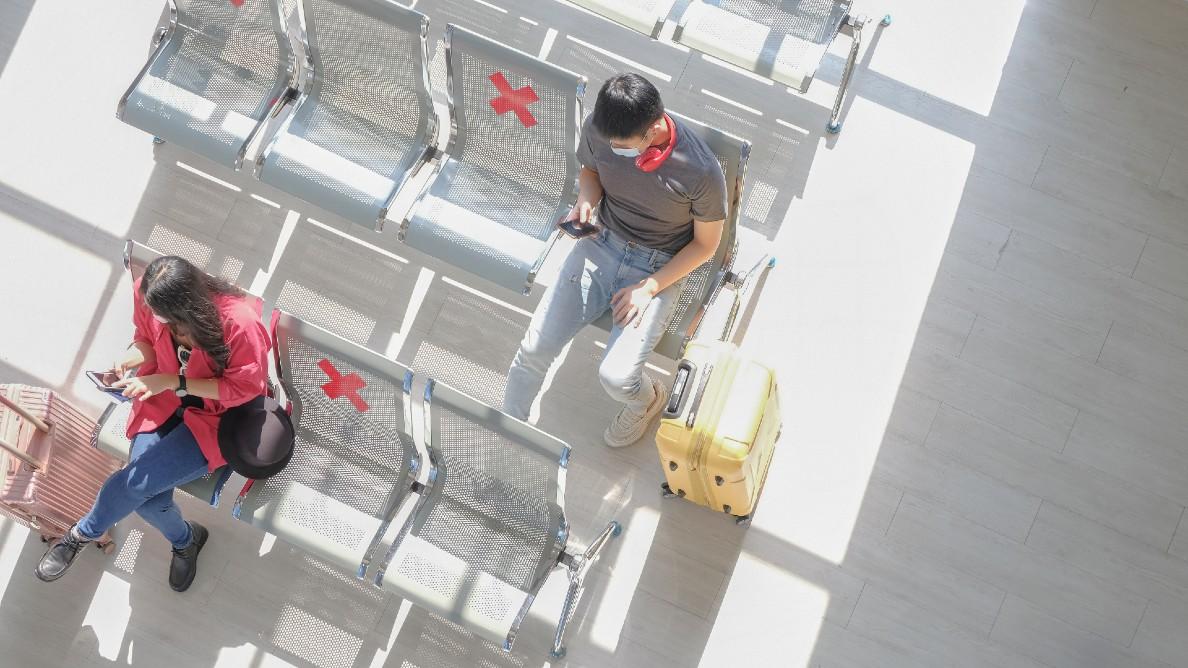INSIGHT
How to fly safe and arrive well during COVID-19

To help you make an informed decision about the safety and well being of your travellers in times of COVID-19, we have prepared the following information. It is your responsibility to ensure your travellers comply with any government travel restrictions.
When it comes to spreading disease, the aviation industry gets a bad rap. It’s true that increased global air travel over the past decade means viruses spread more quickly, but planes themselves aren’t to blame. Anywhere that large groups gather and mix are equally susceptible, but COVID-19 travel bans have put the spotlight on air travel.
So why all the fuss? Because COVID-19 is a new strain of the coronavirus not previously identified in humans. This new strain is fueling speculation, misinformation and general unease. Focusing on air travel however, there are precautions you can take to minimise your risk of becoming unwell.
Wash hands regularly
If soap and water are not available to clean your hands, use a hand sanitiser which is at least 60% alcohol. Experts agree that good old-fashioned hand washing with soap and water for at least 20 seconds (which is the time it takes to sing ’Happy Birthday’ to yourself twice) is the best defense and caution that constant use of hand sanitiser can irritate your skin.
Practice good hygiene
Respiratory diseases like COVID-19 spread through droplets of saliva or mucus, usually when people cough or sneeze, then others come in contact with the droplets. So avoid touching your own eyes, nose and mouth with unwashed hands, as viruses most frequently enter the body through these routes.
If you’re unwell, don’t travel
COVID-19 appears to have an incubation period of at least 14 days, unlike regular flu which is 2 days. Mandatory COVID-19 testing at selected airports aside, most international airports are conducting temperature checks for arriving, departing and transiting passengers, so there’s the chance that you could be denied boarding for having a fever unrelated to COVID-19. So protect yourself, and other travellers, by not flying when you’re sick.
Cover up
Cover your mouth and nose when you cough, sneeze into your elbow and wear a facemask to protect your fellow travellers. If you begin to feel sick while at work, go home as soon as possible.
Clean up
While many airlines have implemented more stringent cleaning measures, including disinfecting and cleaning surfaces in between each flight, there is no guarantee that every surface will get the full treatment. So carry antibacterial wipes to clean your seat armrest, tray table, seat-back pocket, air vent, seat touch screen, headrest and window blind. The same advice is sensible for other items frequently used by travellers, including hotel television remote controls and clean your hands after travelling on shuttles, taxis, holding handrails and using elevators.
Breathe easy
Almost all modern aircrafts have HEPA (High Efficiency Particle Arrester) filters that will filter 99.999% of dust particles and airborne contaminants such as viruses and bacteria, ensuring the highest possible quality of cabin air. However infection specialists suggest a window seat, away from passenger foot traffic, could offer you a bit more protection.
Upgrade
If your travel policy allows, now is a good time to upgrade to business or first class travel. It will give you a small buffer of extra personal space and potentially less contact with other passengers
Stay clear of people with a cough or cold
Experts define exposure as being within 6 feet of an infected person for 10 minutes or more. On aircraft, the World Health Organization defines contact with an infected person as being seated within two rows of one another. But also remember that passengers walk around, go to the bathroom and touch many surfaces.
Counteract low humidity
The low humidity in aircraft cabins dries out the mucous membranes of your eyes, nose and mouth, making them less effective in blocking out viruses. For this reason, some frequent flyers swear by nasal sprays to moisturise and clean out the nose. Also drink more water to compensate for the cabin dryness. However, new generation long haul aircraft such as the Boeing 787 Dreamliner feature technology that allows for higher humidity levels.
Have vaccinations up-to-date
If not yet eligible for the COVID-19 vaccine, having all other essential vaccinations up-to-date will help you stay healthy and prevent your immune system from being compromised.
Stay up-to-date with travel advice
If traveling internationally, make sure to check Singapore's Immigration & Checkpoints Authority (ICA) website for the latest information and advice. FCM customers can also visit our COVID-19 Travel Hub or use our travel technology to keep track of health advisories issued by WorldAware and to locate travellers.
Travel insurance
Travellers who bought travel insurance before COVID-19 became a ‘known event’ may be covered for medical expenses and cancellations. Most travel insurance companies tend to exclude cover for pandemics and epidemics, if you read the fine print. Insurance policies vary greatly, so it’s best to contact the insurance company directly or inquire via your travel manager.
Use your Travel Consultant
At times like this, having a dedicated travel team and a travel management company with a genuine 24/7 emergency hotline (not just an answering service) is priceless. Should you be quarantined or denied entry to a country your FCM travel consultant can help with accommodation, flight changes, cancellations and alternative routing. Also download your travel company’s mobile app to stay up-to-date with travel alerts and changing conditions.